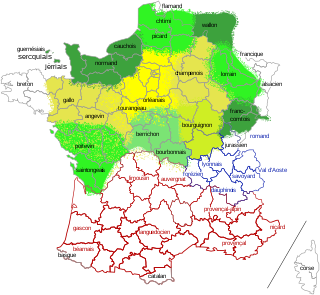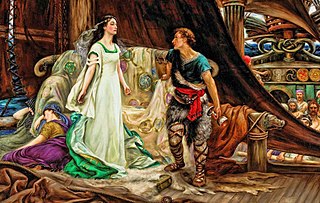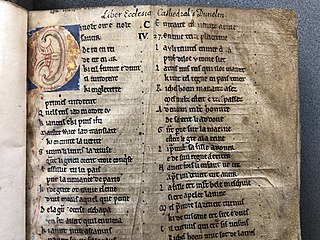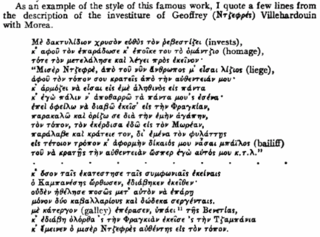
Bruno Paulin Gaston Paris was a French literary historian, philologist, and scholar specialized in Romance studies and medieval French literature. He was nominated for the Nobel Prize in Literature in 1901, 1902, and 1903.

Picard is a langue d'oïl of the Romance language family spoken in the northernmost of France and parts of Hainaut province in Belgium. Administratively, this area is divided between the French Hauts-de-France region and the Belgian Wallonia along the border between both countries due to its traditional core being the districts of Tournai and Mons.

Tristan and Iseult, also known as Tristan and Isolde and other names, is a medieval chivalric romance told in numerous variations since the 12th century. Based on a Celtic legend and possibly other sources, the tale is a tragedy about the illicit love between the Cornish knight Tristan and the Irish princess Iseult. It depicts Tristan's mission to escort Iseult from Ireland to marry his uncle, King Mark of Cornwall. On the journey, Tristan and Iseult ingest a love potion, instigating a forbidden love affair between them.

Medieval French literature is, for the purpose of this article, Medieval literature written in Oïl languages during the period from the eleventh century to the end of the fifteenth century.

The Brut or Roman de Brut by the poet Wace is a loose and expanded translation in almost 15,000 lines of Norman-French verse of Geoffrey of Monmouth's Latin History of the Kings of Britain. It was formerly known as the Brut d'Engleterre or Roman des Rois d'Angleterre, though Wace's own name for it was the Geste des Bretons, or Deeds of the Britons. Its genre is equivocal, being more than a chronicle but not quite a fully-fledged romance. It narrates a largely fictional version of Britain's story from its settlement by Brutus, a refugee from Troy, who gives the poem its name, through a thousand years of pseudohistory, including the story of king Leir, up to the Roman conquest, the introduction of Christianity, and the legends of sub-Roman Britain, ending with the reign of the 7th-century king Cadwallader. Especially prominent is its account of the life of King Arthur, the first in any vernacular language, which instigated and influenced a whole school of French Arthurian romances dealing with the Round Table – here making its first appearance in literature – and with the adventures of its various knights.

Girart de Roussillon, also called Girard, Gérard II, Gyrart de Vienne, and Girart de Fraite, was a Frankish Burgundian leader who became Count of Paris in 837, and embraced the cause of Lothair I against Charles the Bald. He was a son of Leuthard I, Count of Fézensac and of Paris, and his wife Grimildis.

Jeremiah Denis Mathias Ford (1873–1958) was an American educator and author. He was the Smith Professor Emeritus of the French and Spanish Languages and Literature at Harvard University from 1907 to 1943. He was the youngest-ever to be appointed a professor at Harvard, the first Catholic faculty, and the last ever appointed as Chairman of the Department of Romance Languages from 1911 to 1943.

The Ludwigslied is an Old High German (OHG) poem of 59 rhyming couplets, celebrating the victory of the Frankish army, led by Louis III of France, over Danish (Viking) raiders at the Battle of Saucourt-en-Vimeu on 3 August 881.

The Chronicle of the Morea is a long 14th-century history text, of which four versions are extant: in French, Greek, Italian and Aragonese. More than 9,000 lines long, the Chronicle narrates events of the Franks' establishment of feudalism in mainland Greece. West European Crusaders settled in the Peloponnese following the Fourth Crusade. The period covered in the Chronicle was 1204 to 1292. It gives significant details on the civic organization of the Principality of Achaia.
Bernard O'Donoghue FRSL is a contemporary Irish poet and academic.

Leeds Modern School was a school in Leeds, West Yorkshire, England.

Anglo-Norman, also known as Anglo-Norman French, was a dialect of Old Norman that was used in England and, to a lesser extent, elsewhere in Great Britain and Ireland during the Anglo-Norman period.

The Bible Historiale was the predominant medieval translation of the Bible into French. It translates from the Latin Vulgate significant portions from the Bible accompanied by selections from the Historia Scholastica by Peter Comestor, a literal-historical commentary that summarizes and interprets episodes from the historical books of the Bible and situates them chronologically with respect to events from pagan history and mythology.

Stephen Romer, FRSL is an English poet, academic and literary critic.
Gabrielle Michele Spiegel is an American historian of medieval France, and the current Krieger-Eisenhower Professor of History at Johns Hopkins University where she served as chair for the history department for six years, and acting and interim dean of faculty. She also served as dean of humanities at the University of California, Los Angeles in 2004–2005, and, from 2008 to 2009, she was the president of the American Historical Association. In 2011, she was elected as a fellow to the American Academy of Arts and Sciences.
Michael Lapidge, FBA is a scholar in the field of Medieval Latin literature, particularly that composed in Anglo-Saxon England during the period 600–1100 AD; he is an emeritus Fellow of Clare College, Cambridge, a Fellow of the British Academy, and winner of the 2009 Sir Israel Gollancz Prize.
Old High German literature refers to literature written in Old High German, from the earliest texts in the 8th century to the middle of the 11th century.
L'âtre périlleux is an anonymous 13th century poem written in Old French in which Gawain is the hero. The name comes from just one of the adventures Gawain takes part in. Forced to spend the night in a chapel in a cemetery, he encounters a woman who has been cursed and is forced to spend the night with a devil each night. He defeats the devil and liberates her. The story draws on influences from other Arthurian romances, such as those of Raoul de Houdenc and Chrétien de Troyes.
Norman Francis Blake was a British academic and scholar specialising in Middle English and Early Modern English language and literature on which he published abundantly during his career.
The Ordene de chevalerie is an anonymous Old French poem written around 1220. The story of the poem is a fiction based on historical persons and events in and around the Kingdom of Jerusalem before the Third Crusade. The title translates to Order of Knighthood.












